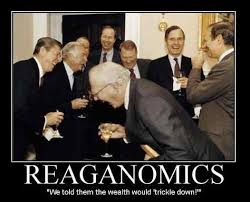The Laffer Prediction

There is a common misconception among a significant minority of Americans that former president Ronald Reagan was some kind of god who transformed the American economy from Hell in a Hand Basket to the New Utopia making everybody rich in the process.
That view, it would seem, is also held by one of his economic advisors at the time, Dr Arthur Laffer. Dr. Laffer was a member of President Reagan’s Economic Policy Advisory Board for both of his two terms (1981-1989).
He was also a member of the Executive Committee of the Reagan/Bush Finance Committee in 1984 and was a founding member of the Reagan Executive Advisory Committee for the presidential race of 1980.
He also advised Prime Minister Margaret Thatcher on fiscal policy in the U.K. during the 1980s. He was in Australia this week on a short speaking tour.
 Dr Laffer is referred to by some as the father of supply-side economics. He is credited with the ‘Laffer Curve’ which somewhat simplistically points out that the optimal tax rate sits somewhere between 0-100%.
Dr Laffer is referred to by some as the father of supply-side economics. He is credited with the ‘Laffer Curve’ which somewhat simplistically points out that the optimal tax rate sits somewhere between 0-100%.
In an interview with Ticky Fullerton on ABC24’s The Business, he made the quite startling claim, “If you thought we did well under Reagan and Clinton, just wait until you see how well we’re going to do under the next president.”
By any measure, that’s a pretty big call. How he knows this was not clarified in the interview but it does call for some explanation of what really happened during the Reagan years.
Reagan supposedly favoured small government, yet over the eight years of his presidency spending as a percentage of GDP increased from 27.9% to 28.7%. He actually increased the size of government.
On the other side of the ledger revenues went from 25.1% of GDP in 1981, to 24.7% in 1988. So, apart from looking after the top end of town, he didn’t really reduce taxes at all.
He did in his first year, but then raised them several times thereafter. He never really cut spending at all. His budget deficits were legendary. His increases in military spending dwarfed any spending cuts.
 The real hero, if there was one, for the American economic recovery in the 1980s was Paul Volker, a democrat, who served as chairman of the Federal Reserve under President Carter and re-appointed to that position by Reagan until 1987.
The real hero, if there was one, for the American economic recovery in the 1980s was Paul Volker, a democrat, who served as chairman of the Federal Reserve under President Carter and re-appointed to that position by Reagan until 1987.
His method of tackling stagflation (high inflation and high unemployment), was to tighten the money supply by raising interest rates. They peaked at an unprecedented 21.5% in 1981.
On face value it worked, although not before causing great pain to the farming community and creating two severe national recessions.
But there were two other factors that may have rendered Volker’s actions unnecessary. One was the 1970’s oil crisis which was the main cause of the inflationary spiral.
The oil crisis spark a renewed search for more oil leading to an increase in production and a subsequent reduction in prices which fed through to a lowering of inflation.
The other was declining support for the union movement and their high wage demands, which eased the wage/price spiral.
Reagan came to the presidency after most of these factors had been set in motion. His initial tax breaks in 1981 made him look a hero particularly as things started to improve.
As a result he got the credit for work already done, similar to John Howard being credited for the 2000s economic success after Hawke and Keating had introduced all the necessary reforms to make that happen.
So, Laffer’s praise of the Reagan administration in lowering taxes seems quite misleading considering the earlier work by Volker when Jimmy Carter was president. It also ignores the impact of the end of the oil crisis in lowering inflation and the declining influence of the unions pay demands.
 Laffer still believes that lower taxes are the key to economic growth. He supports the much discredited trickle down and rising boats theories and seems to ignore other areas of Reagan’s economic record.
Laffer still believes that lower taxes are the key to economic growth. He supports the much discredited trickle down and rising boats theories and seems to ignore other areas of Reagan’s economic record.
By any measure, the national debt would be the biggest statistic by which Reagan should be measured. Over his eight year presidency, it doubled from $900 billion to $2.7 trillion. Not much evidence of spending restraint there.
Notwithstanding all that, plenty of people got rich with Reagan and a few, mostly bankers, got filthy rich. Most peoples’ living standards, however, only improved marginally.
Reagan also deregulated the finance industry enabling banks and Savings and Loan institutions to invest in ways nobody had ever dreamed.
It didn’t take much time for these groups to realise what they could do with other peoples’ money. During the Clinton years, some quite reckless sub-prime housing loans became available to people who could never pay them back.
There were plenty of warning signs of the dangers inherent in those decisions when the S&L’s began to fail, but nobody blamed Reagan.
 Suddenly, financial institutions sprung up everywhere bundling ordinary peoples’ life-savings as investment stock together with bad mortgage stock, on-selling it to other institutions, insuring themselves with credit default swaps, all of which lay the groundwork for the Global Financial Crisis of 2008.
Suddenly, financial institutions sprung up everywhere bundling ordinary peoples’ life-savings as investment stock together with bad mortgage stock, on-selling it to other institutions, insuring themselves with credit default swaps, all of which lay the groundwork for the Global Financial Crisis of 2008.
That is not to excuse Clinton of any responsibility but the reality is, it started with Reagan.
So, by what measure Dr Laffer expects the next American administration to be better than the Reagan/Clinton years is something of a mystery.
Perhaps someone out there can enlighten me.









21 comments
Login here Register here-
Kerri -
Kerri -
John Kelly -
Kaye Lee -
-
Jexpat -
CommonA -
JohnB -
Kerri -
Scott -
DanDark -
Zolf -
Kaye Lee -
Kerri -
eli nes -
Audioio -
Jexpat -
stephentardrew -
CommonA -
Kyran -
Jamie Gonzalez
Return to home pageThanks so much John Kelly. Haven’t read yet. Will in next 10 minutes but wanted to say thanks to you and Michael. So nice to be listened to.
Mmmm! Read it now. So Laffer is one of those simplistic economists that believe if you let everyone do exactly what they want it will all be good! A bit like Abbott’s response to the hepatitis frozen berries issue. Along the lines of good businesses wouldn’t poison their customers. This comment alongside others to the effect that you can’t trust muslims because there are terrorists and death cults out there. I have also read that yesterday moves began to no longer require deaths and poisonings due to food contamination be reported publicly. Another great idea from these fools. The GFC happened because the US govt allowed freedom. Small Government actually means no regulations and rather than all boats rising the big fish eat the small fish!!!
Thank you for bringing it to our attention, Kerri.
I saw Laffer interviewed elsewhere. He sounded more like a talk show host than an economist. He is a proponent of a flat rate of taxation – quel supris! He was saying stuff like “the unemployed are people just like you and me”. Thanks for that epiphany. He asserts that by making the rich richer we will achieve full employment. Well I don’t see Gina rushing out altruistically employing more of us – quite the reverse, she wants to import cheap labour from overseas so she doesn’t have to worry about workplace entitlements and she can sack them whenever she pleases. I found the interview cringeworthy. I had a great deal more confidence listening to John Daley from the Grattan Institute who made Hockey look like an economic moron.
Pingback: The Laffer Prediction | THE VIEW FROM MY GARDEN
Reagan didn’t get a larger share of the blame for the S&L crisis because the Garn-St Germain Depository Institutions Act (the key piece of legislation involved) was pushed through by a Democratic Congress, despite being warned of the eminently foreseeable consequences.
Down the track, this became a pattern with the Democrats- one that persists to this day.
Still being an economic moron myself, why is it that Paul Volker is lauded when his actions resulted in “creating two severe national recessions”, and Paul Keating is applauded for the “recession we had to have”, yet Wayne Swan is celebrated for avoiding recession? Did the Labor party lose it’s way somewhere, or were the economic considerations so different that it demanded a different response?
I am surprised that Laffer spoke so honestly:
“If you thought we did well under Reagan and Clinton, just wait until you see how well we’re going to do under the next president.”
In being startled by that comment John you have obviously misunderstood just who he was referring to in his use of the royal “we”.
I read his “we” as meaning those that progressive’s commonly refer to as “them” – the banksters, financiers, the corporate ‘robber barons’, the 0.01% hyper wealthy whose interests he represents.
In that context his statement is outrageously arrogant – but true.
When I say I found his attitude simplistic it isn’t just in the economic theory but also his attitude. I was shocked that someone discussing national economics could be so flippant and laissez-faire. It seems to go against everything I understand about world economics. I’m sorry but I have to say I found him Lafferble. He seemed so foolishly chirpy that it smacked of “don’t you worry about that” and a great deal of, at best insincerity, at worst chicanery. And the idiots in charge here want to follow the US??? Does anyone know who brought him out here? A snake oil salesman like Laffer doesn’t travel on his own purse!
I would guess that laffer is talking about the 18.5 year economic cycle that many politicians have benefited from (the real estate clock).
http://www.brisbanetimes.com.au/federal-politics/political-news/it-wasnt-ours-says-treasury-of-intergenerational-report-20150318-1m2csq.html
Ticky who? Her show is nothing but a parade for neo-cons. Great job Aunty.
Kerri,
“The Institute of Public Affairs and the Australian Chamber of Commerce and Industry invite you to a special event with Dr Arthur Laffer, member of Ronald Reagan’s Economic Policy Advisory Board, and inventor of the Laffer Curve.”
https://www.ipa.org.au/events/information/event/arthur-laffer—melbourne
Thanks Kaye Lee! Should’ve picked that! Doh!
not sure that it is a laffing matter but the tea party will win the next septic election then gina et al will be able to employ yanks at 40%.wages
“Over his eight year presidency, it doubled from $900 billion to $2.7 trillion.”
You’re as good with figures as Laffer!
Audioio:
Don’t look now, but thanks to the LNP and their innumerate media sycophants, we now have our own Laffer at Treasury in Reagan worshiping John Fraser!
It should be interesting to watch as he and Fairfax’s privatisation apologist Ross Gittins tirelessly turn gold into straw.
No one can enlighten you John because the facts are antithetical to the predictions of supply side economics. There is no proof that lowering taxes stimulates the economy. The little number attached, written by Robert Reich, warns of the coming dysfunction of current economic models. Jacques Fresco developed the Venus Project for just this reason and though he appears to be Utopian his predictions are coming true and his solutions of a highly automated cashless society more relevant. The US are busy sending out their neo-conservative lobbyists to defend their patch while trying to discourage involvement in China’s Infrastructure Bank and subsequent undermining of US currency hegemony. Europe is becoming wary of the US as they challenge US dogmatic absolutism and interference throughout the world. Even the Brits, with the most corrupt financial sector in the City of London, are getting cold feat.
Things are changing at an accelerated rate, as predicted by Ray Kurzweil, and the old slow-mo static models of economic conservatism are about to be radically challenged by the very failures they cannot predict nor control. It’s time to challenge the eight year cycle of boom bust based upon entirely dysfunctional economic theories. It is insane to repeat the same disaster over and over again convincing the world that only the purveyors of cyclical disasters are the ones that can solve it with more of the same. This irrational crap has been going on for decades and if these bastards have their way will continue until they have extorted every pound of flesh possible from the middle, working class, low income earners and poor.
Who is going to stand up and face the greed ridden one percent?
We Need a New Economic Model Because the Current Model Is Falling Apart
http://www.truthdig.com/report/item/we_need_a_new_economic_model_because_current_model_falling_apart_20150318#14267845363451&action=collapse_widget&id=2406228
The Venus Project – Future By Design – Full documentary
European Allies Are Declaring Their Independence from Irresponsible U.S.
http://www.truthdig.com/report/item/european_allies_declaring_independence_from_irresponsible_us_20150319#14267845399551&action=collapse_widget&id=276268
@stephentardrew, very interesting article… in my own words; if everything were done by robots, then where is the place for humans in the current economic model? I need to think more on that one.
One of the comments on that article (Trish House), seems to indicate something that sounds very like the old-testament model for economics… land (resources) are owned perpetually by the family, they can effectively rent (sell) this to others but it is returned on the year of jubilee (and slaves go free)… so no family is in slavery for ever… I know Canberra has tried this sort of model (100 year leases on residential land, rather than perpetual title), but that seems the wrong way round (good for Government, not so good for the people). Perhaps if every mortgage/loan had a fixed termination date (regardless of how much was left “owing”) then we would see better lending practices? But yes, I do like the idea that each person enters the world with an intrinsic value, and we must pay them for it, rather than the other way round…. how to achieve that in reality is the big question.
Many of the reports on the GFC were scathing on the whole ‘sub prime’ system, which was based on low doc loans with traditional constraints being removed or ignored. The growth of low equity loans, payday type lending and incredibly lax consumer protection laws in Australia leads me to think another GFC is on the way.
This article describes a system that is inherently wrong in allowing the abuse of the vulnerable for the profit of a business. Ironically, the article is a warning to investors in the company that it can only profit while the current “light handed regulation” of the industry exists.
http://www.abc.net.au/news/2015-03-20/radio-rentals-reaps-90-million-in-centrelink-payments/6333690
It seems, having ignored the lessons of the past, we are indeed destined to repeat them. Thank you Mr Kelly for the reminder. I doubt any of the IPA/Tea Party collegiate will accept responsibility for the inevitable outcome of their spruiking. Surely, it will be the victims fault! Take care
I’m always perplexed by the Right’s fascination with Reagan, thanks for writing this.